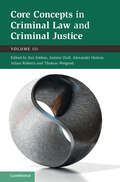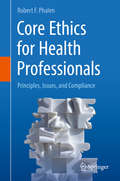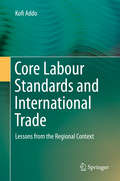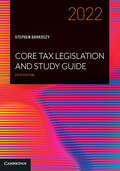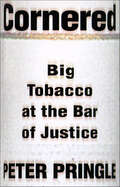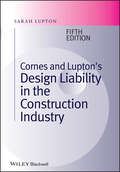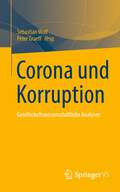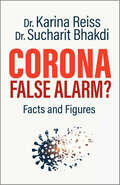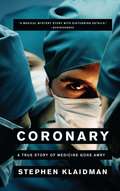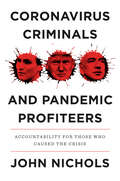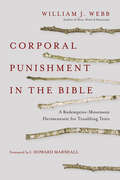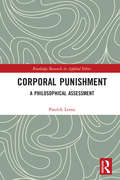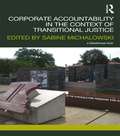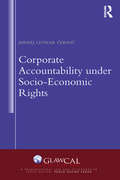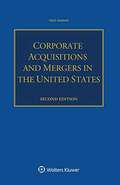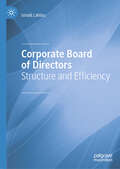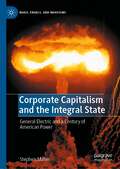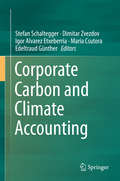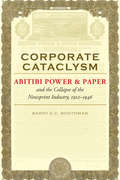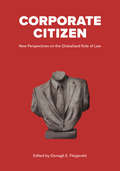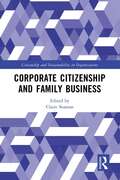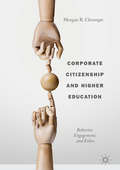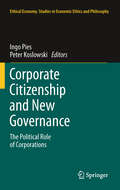- Table View
- List View
Core Concepts in Criminal Law and Criminal Justice: Volume III
by Kai Ambos Julian Roberts Thomas Weigend Alexander Heinze Anthony DuffAttempts at trans-jurisdictional debate and agreement are often beset by mutual misunderstandings. And while English is the new lingua franca in international and comparative criminal law, there are many ambiguities and uncertainties with regard to foundational criminal law and justice concepts. Professionals and academics engaged in collaborative comparative criminal law projects often do not understand each other, using the same terms with different meanings or different terms meaning the same thing. However, there exists greater similarity among diverse systems of criminal law and justice than is commonly realised. This third volume of Core Concepts in Criminal Law and Criminal Justice explores the principles and concepts that underpin the different domestic systems and rules. It will focus on the Germanic and several principal Anglo-American jurisdictions, which are employed as examples of the wider common law-civil law divide.
Core Ethics for Health Professionals: Principles, Issues, and Compliance
by Robert F. PhalenA timely overview of ethics, emphasizing applications to biomedical researchers, health providers, and administrators There are no simple rules to guide ethical conduct in daily practice, health professionals must have a basic understanding of several topics including ethical theories; ethical scandals; laws, regulations, and institutional policies; and public perceptions. This book can be used for self-study, for classroom instruction, and as a refresher and update by practicing health professionals. The chapters have learning objectives, focused content, a summary of important points, a quiz, and a list of key references. Although the book is arranged in a logical order, each chapter may be studied independently.
Core Labour Standards and International Trade: Lessons from the Regional Context
by Kofi AddoThis book examines the labour standards provisions in a number of Regional and Bilateral Trade Agreements, and assesses the potential of using the relevant clauses in these trade agreements as a benchmark for a multilateral approach. Based on the lessons learned from the Regional model, the book proposes a Global Labour and Trade Framework Agreement (GLTFA) combined with a joint ILO/WTO enforcement mechanism to resolve the contentious issue of the link between the CLS and international trade. The history of the linkage between the Core Labour Standards (CLS) and international trade dates back roughly 150 years, and has recently become one of the most vexing issues facing policy-makers. At the heart of the debate is the question whether or not trade sanctions should be imposed on countries that do not respect the CLS as embodied in multilateral conventions administered by the International Labour Organization (ILO). Concretely, this would entail inserting a social clause in the World Trade Organization (WTO) rules, and would trigger the imposition of sanctions on those countries that do not adhere to the CLS.
Core Tax Legislation and Study Guide 2022 Core Tax Legislation and Study Guide 2022
by Stephen BarkoczyCore Taxation Legislation and Study Guide is a reference text for students undertaking tax subjects. It provides curated extracts of legislation as well as useful guidance on study skills. Part 1: The Study Guide assists students to prepare for a tertiary taxation course and conduct basic taxation research. It refers to key reference material, including websites and research tools, and includes useful tips on study techniques, researching a tax problem, essay writing and presentation, answering taxation law exam questions and how to cite legislation, cases, articles, rulings and reports for assignments. Part 2: The Core Tax Legislation comprises selected extracts from relevant sections of taxation legislation and regulations. An essential resource, this text allows students to access the parts of the legislation they will need for a taxation law course in a time-saving and user-friendly way. Core Taxation Legislation and Study Guide 2022 is designed to be used in conjunction with Foundations of Taxation Law 2022.
Cornered: Big Tobacco at the Bar of Justice
by Peter PringleIn New Orleans, the widow of an attorney who died of lung cancer vowed to avenge his death by suing the tobacco companies. In Clarksdale, Mississippi, an outraged country lawyer discovered the cost of lung cancer care as his secretary's mother lay dying. In Washington, D.C., a young pediatrician became the first FDA administrator in ninety years to decide nicotine should be regulated as a drug. All three were warned: Don't mess with Big Tobacco.Then a $9-an-hour law clerk in Louisville, Kentucky, stole thousands of incriminating tobacco company documents. Suddenly, an untouchable industry was under siege. In the vanguard of the attack were the nation's toughest liability lawyers. Thirty-nine states would ultimately join the battle, seeking billions of Midicaid dollars spent on tobacco-related diseases. The costliest civil litigation in history had begun.The $50 billion tobacco industry had finally met its match. Motivated as much by anger as by greed, liability lawyers with noms de guerre like "the Aspestos Avenger" and "the Master of Disaster" outflanked and outsmarted the once invincible legal armies of Big Tobacco. In 1994, sixty of these lawyers came together, pooling their talents, their time, and their war chests to launch a ferocious nationwide assault. At the same time, they provided the legal muscle behind the state suits. Three years later, they had forced the industry to the negotiating table. The result is a $368 billion deal that will eventually change the way Big Tobacco does business. Cornered is the first full account of this unprecedented legal battle. It uses confidential memos to explain how the companies avoided government regulation and legal redress for so many years. It moves from the early skirmishes in rural Mississippi to strategy sessions in the back rooms of New Orleans restaurants, from a warehouses in England stuffed with 9 million company documents to the corridors of power in the nation's capital. It follows the whistle-blowers who laid bare the evidence that made the litigtion possible, and it winds through the offices of the state attorneys general whose Medicaid lawsuits lent a halo of respectability to the "yunkyard dogs" of liability law. It is a tale at once dramatic, funny, and enraging. In the end, it is proof that the plaintiff's bar can initiate social change, even as it loots the coffers of corporate rascals.
Cornes and Lupton's Design Liability in the Construction Industry
by Sarah LuptonLiability for the design of a building or structure is of fundamental concern to construction professionals, design-build contractors, specialist sub-contractors, and lawyers. Although other texts cover a wide range of aspects of liability, only Cornes and Lupton's Design Liability in Construction draws together all those matters that relate specifically to design.A number of factors have come together recently and are addressed in this significant update and rewrite of the 4th edition, including: popularity of design & build procurementpartnering arrangements and early contractor involvementnew standard forms of construction contract and appointment, and revisions to older formstechnical innovations in constructioncollaborative working and BIM systemsmany well-publicised cases regarding design failuressignificant developments in the law of tort and professional liabilitythe development of the single European market and increased provision of services overseasTogether these factors create a new range of design liability issues which the construction professional has to face. Written for lawyers, architects, engineers, and contractors, the fifth edition of Design Liability in Construction will also serve as a useful text for masters level courses in engineering, surveying and construction law.
Corona und Korruption: Gesellschaftswissenschaftliche Analysen
by Sebastian Wolf Peter GraeffDer Sammelband analysiert aus einer interdisziplinären Perspektive Auswirkungen der Corona-Pandemie auf Korruptionsformen, Korruptionsbekämpfung und Korruptionsforschung. So werden insbesondere spezifische Korruptionsgefahren durch die weitreichenden staatlichen Maßnahmen zur Eindämmung der Pandemie und ihrer Folgen in den Blick genommen. Theoretische und überblicksartige Erörterungen werden ergänzt durch empirische Fallstudien zu Brasilien und Deutschland. Ein Beitrag thematisiert Gemeinsamkeiten von COVID-19 und Korruption hinsichtlich der Erhebung von Umfragedaten. Der Band versammelt vor allem politikwissenschaftliche, soziologische und rechtswissenschaftliche Untersuchungen.
Corona, False Alarm?: Facts and Figures
by Karina Reiss Sucharit BhakdiDoes the race for vaccine development make sense? What are the chances of success? Will the vaccine be safe? Will people accept it??In June 2020, Corona, False Alarm? exploded into the German market, selling 200,000 copies and 75,000 e-books in the first six weeks.No other topic dominates our attention as much as coronavirus and COVID-19, the infectious disease it triggers. There&’s been a global deluge of contradictory opinions, fake news, and politically controlled information. Differing views on the dangers posed by the pandemic have led to deep division and confusion, within governments, society, and even among friends and family.In Corona, False Alarm?, award-winning researchers Dr. Sucharit Bhakdi and Dr. Karina Reiss give clarity to these confusing and stressful times. They offer analysis of whether radical protective measures—including lockdown, social distancing, and mandatory masking—have been justified, and what the ramifications have been for society, the economy, and public health. Dr. Bhakdi and Dr. Reiss provide dates, facts, and background information, including:• How Covid-19 compares with previous coronaviruses and the flu virus• What infection numbers and the death rate really tell us• The challenges around lockdown: Were the protective measures justified?• Mandatory mask-wearing: Does the science support it?• Vaccines: What are the chances of success? What are the risks?Corona, False Alarm? provides you with sound information and substantiated facts—and encourages you to form your own opinion on the corona crisis.
Coronary: A True Story of Medicine Gone Awry
by Stephen KlaidmanA chilling real-life medical thriller, Coronary chronicles the story of two highly respected heart doctors who violated the most sacred principle of their profession: First, do no harm. In the summer of 2002, fifty-five-year-old John Corapi, a Catholic priest with a colorful background, visited Dr. Chae Hyun Moon, a celebrated cardiologist in Redding, California. Corapi had been suffering from exhaustion and shortness of breath, and although a physical examination and a conventional stress test revealed nothing abnormal, Moon insisted that the calcium level in Corapi's coronary arteries called for a highly invasive diagnostic test: an angiogram. A chain-smoking Korean immigrant known for his gruff bedside manner, Moon performed the procedure briskly and immediately handed down a devastating diagnosis: "I'm sorry; there is nothing I can do for you. You need a triple bypass tomorrow morning." He then abruptly left the room. Several hours later, however, Moon inexplicably decided the surgery could wait until Corapi returned from a previously scheduled cross-country trip. Unnerved by the dire diagnosis and also by Moon's inconsistent statements, Corapi sought other opinions. To his amazement, a second, third, and fourth doctor found that his heart was perfectly healthy. In fact, for a man his age, Corapi's arteries were remarkably free of disease. Sensing a cause more disturbing than human error, Corapi took his story to the FBI. As local agent Mike Skeen soon discovered, Corapi was one of a number of people who had suspicions about Moon and Moon's go-to cardiac surgeon, Dr. Fidel Realyvasquez, an equally respected member of the close-knit northern California community. Working at a hospital owned by Tenet Healthcare, Moon would make the diagnoses and Realyvasquez would perform the surgeries. Together, these leaders of the Redding medical establishment put hundreds of healthy people at risk, some of whom never recovered. Soon Skeen launched a major investigation, interviewing numerous doctors and patients, and forty federal agents raided the hospital where the doctors worked.A timely and provocative dissection of America's medical-industrial complex, Coronary lays bare the financial structures that drive the American healthcare system, and which precipitated Moon's and Realyvasquez's actions. In a scheme that placed the demands of Wall Street above the lives of its patients, Tenet Healthcare rewarded doctors based on how much revenue they generated for the corporation. A meticulous three-year FBI investigation and hundreds of civil suits culminated in no criminal charges but a series of settlements with Tenet Healthcare and the doctors that totaled more than $450 million and likely put an end to Moon's and Realyvasquez's medical careers. The case's every twist and turn is documented here. A riveting, character-rich narrative and a masterpiece of long-form journalism, Coronary is as powerful as it is alarming. This is a hair-raising story of the hundreds of men and women who went under the knife, not in the name of medicine, but of profit and prestige. Brilliantly told, Stephen Klaidman's Coronary is a cautionary tale in the age of miracle medicine, and a shocking reminder to always get a second opinion.
Coronavirus Criminals and Pandemic Profiteers: Accountability for Those Who Caused the Crisis
by John NicholsA furious denunciation of America&’s coronavirus criminalsHundreds of thousands of deaths were caused not by the vicissitudes of nature but by the callous and opportunistic decisions of powerful people, as revealed here by John Nichols. On March 10, 2020, president Donald Trump told a nation worried about a novel coronavirus, &“We&’re prepared, and we&’re doing a great job with it. And it will go away. Just stay calm. It will go away.&” It has since been estimated that had Trump simply taken the same steps as other G7 countries, 40 percent fewer Americans would have died. And it was not just the president. His inner circle, including Mike Pence and Jared Kushner, downplayed the crisis and mishandled the response. Cabinet members such as Betsy DeVos and Mike Pompeo undermined public safety at home and abroad to advance their agendas. Senators Ron Johnson and Mitch McConnell, governors Kristi Noem and Andrew Cuomo, judges such as Wisconsin Supreme Court justice Rebecca Bradley all promulgated public policies that led to suffering and death. Meanwhile, profiteer Pfizer (and anti-government propagandists such as Grover Norquist) fed at the public trough, while the billionaire Jeff Bezos added pandemic profits to a grotesquely bloated fortune. John Nichols closes with a call for a version of the Pecora Commission, which took aim at what Franklin Delano Roosevelt called the &“speculation, reckless banking, class antagonism, and profiteering&” that stoked the Depression. There must be accountability.
Coroner at Large
by Thomas T. Noguchi Joseph DimonaNoguchi, once Chief Medical Examiner for Los Angeles, is fascinated by forensic evidence in crimes. He applies forensic principles to many recent cases plus historical ones.
Corporal Punishment in the Bible: A Redemptive-Movement Hermeneutic for Troubling Texts
by William J. WebbSlaves, Women and Homosexuals,
Corporal Punishment: A Philosophical Assessment (Routledge Research in Applied Ethics)
by Patrick LentaThe aim of this book is to assess the moral permissibility of corporal punishment and to enquire into whether or not it ought to be legally prohibited. Against the widespread view that corporal punishment is morally legitimate and should be legally permitted provided it falls short of abuse, Patrick Lenta argues that all corporal punishment, even parental spanking, is morally impermissible and ought to be legally proscribed. The advantages claimed for corporal punishment over alternative disciplinary techniques, he contends, are slight or speculative and are far outweighed by its disadvantages. He presents, in addition, a rights-based case against corporal punishment, arguing that children possess certain fundamental rights that all corporal punishment of them violates, namely the right to security of the person and the right not to be subjected to degrading punishment. Lenta’s approach is unique in that it engages with empirical literature in the social sciences in order to fully examine the emotional and psychological effects of corporal punishment on children. Corporal Punishment: A Philosophical Assessment is a philosophically rigorous and engaging treatment of a hitherto neglected topic in applied ethics and social philosophy.
Corporate Accountability in the Context of Transitional Justice
by Sabine MichalowskiCorporate Accountability in the Context of Transitional Justice explores how corporations can be held accountable for their role in past human rights violations when a country is making a transition from conflict or repression to peace and democracy. It breaks new ground in theorizing the linkages between the areas of transitional justice and corporate accountability and analyzing problems frequently arising where the two fields meet in practice, for example where the role of corporations in past human rights violations is examined by truth and reconciliation commissions or in the course of litigation. The book provides an overview of the current trends in law and in legal and political discussion relating to both areas, as well as in-depth analysis of how tools of corporate accountability and transitional justice can complement each other in order to achieve the best outcomes for bringing justice to victims and lasting peace to societies. The authors bring extensive experience from diverse professional backgrounds and jurisdictions to provide the first sustained attempt to address this link. The book will be of interest to scholars, practitioners, policymakers and activists working in the areas of transitional justice; corporate accountability; and business and human rights.
Corporate Accountability under Socio-Economic Rights (Transnational Law and Governance)
by Jernej Letnar ČerničIn recent decades, corporations have increasingly accepted that they have obligations to respect the socio-economic rights of individuals whose rights to livelihoods, education, food, health, housing and water are affected by the actions of corporations on a daily basis. Despite this, it is often difficult for victims to bring corporations to court for violations of their socio-economic rights. Domestic constitutional systems provide, at best, fragile and limited protections against adverse corporate activities, while international responses have been lacking in creating obligations and accountability for corporations under socio-economic rights. The urgency of bolstering corporate accountability for socio-economic rights is therefore apparent. In light of this, this book asks whether corporations are required to observe socio-economic rights and if they are accountable for any violations. In doing so, it identifies and analyzes the theoretical foundations and the existing scope of corporate accountability arising from socio-economic rights at both national and international levels. Through careful analysis, Jernej Letnar Černič exposes the stark need for greater clarity in the obligations and accountability of corporations, advocating a normative framework for corporate accountability for socio-economic rights in national legal orders which builds on existing mechanisms.
Corporate Acquisitions And Mergers In The United States
by Vijay SekhonDerived from Kluwer’s multi-volume Corporate Acquisitions and Mergers, the largest and most detailed database of M&A know-how available anywhere in the world, this work by a highly experienced partner at the leading international law firm Sidley Austin LLP provides a concise, practical analysis of current law and practice relating to mergers and acquisitions of public and private companies in the United States. The book offers a clear explanation of each step in the acquisition process from the perspectives of both the purchaser and the seller. Key areas covered include: structuring the transaction; due diligence; contractual protection; consideration; and the impact of applicable company, competition, tax, intellectual property, environmental and data protection law on the acquisition process. Corporate Acquisitions and Mergers is an invaluable guide for both legal practitioners and business executives seeking a comprehensive yet practical analysis of mergers and acquisitions in the United States. Equivalent analyses of M&A law and practice in some 50 other jurisdictions, all contributed by leading law firms, are accessible on-line at www.kluwerlawonline.com. under Corporate Acquisitions and Mergers.
Corporate Board of Directors: Structure and Efficiency
by Ismail LahlouCorporate governance, a subject that a few decades ago escaped the attention of all but a handful of academics and shareholders, has gradually become a central concern worldwide. This book contributes to the existing literature on the structure and effectiveness of corporate boards. It comprises three topics that address distinct research questions on board structure, the deployment of board resources to monitoring and advisory duties, and the use of equity-based incentives in the compensation packages of directors. Firstly, the book provides strong new evidence on the importance of corporate board functions in value creation. Secondly, it provides some evidence of the potential conflict between the two primary functions of corporate boards. The results indicate that while the board’s advising quality weakens when the board is principally devoted to monitoring duties, the presence of advisory directors on the board does not have any impact on the effectiveness of board oversight, which offers a more complete view on the tradeoffs between the board’s two major functions. Finally, the results suggest that the closer directors' compensation is tied to the firm's stock, the more consistent corporate acquisition decisions are with shareholder interests.
Corporate Capitalism and the Integral State: General Electric and a Century of American Power (Marx, Engels, and Marxisms)
by Stephen MaherThis book advances an original conception of the relationship between state and corporate power in the United States. Using what he terms an Institutional Marxist framework, Maher argues that, far from passively responding to interest group pressures, the state has been a key agent in politically mobilizing business, and has played an active role in the organization of lobbying groups. Such business associations do not merely express the pre-existing interests of their corporate members, but are also mechanisms through which the state organizes the political power of the capitalist class. They form part of what the author refers to as an integral state—a wider network of state power which traverses and interpenetrates the state bureaucracy, the legislature, the industrial policy apparatus, and corporate governance. Based on extensive archival research, this book tracks the role of the General Electric Company as a pillar of the integral state in the United States from the finance capital period (1880 to 1930), through the managerial period (1930-1979), to the restructuring leading up to the age of neoliberalism (1979-present).
Corporate Carbon and Climate Accounting
by Stefan Schaltegger Dimitar Zvezdov Igor Alvarez Etxeberria Maria Csutora Edeltraud GüntherThis volume is devoted to management accounting approaches for analyzing business benefits and costs of climate change. It discusses future directions on carbon accounting, performance measurement and reporting as well as links between climate accounting and business processes, product and service development, supply chain innovation, economic successes and stakeholder relations. Companies are increasingly called on to contribute to combatting climate change and also face the challenges presented by climate-change related costs, risks and benefits. Risks can result from unpredictable weather conditions and government regulations, such as the EU emission trading system and new building codes. Climate change also offers numerous opportunities, such as energy efficiency innovations and carbon neutral products and production. Good management requires that carbon emissions are tracked and climate-related costs, risks and benefits are identified, measured and assessed. As such, research addressing corporate accounting frameworks and tools is of increasing importance when it comes to managing these carbon and climate-related issues.
Corporate Cataclysm: Abitibi Power & Paper and the Collapse of the Newsprint Industry, 1912–1946 (Themes in Business and Society)
by Barry E.C. BoothmanIn this absorbing narrative, Barry E.C. Boothman traces the history of Abitibi Power and Paper Limited alongside the rise and fall of the newsprint industry and the advent of Canadian corporate capitalism. In the first half of the twentieth century, Abitibi was Canada’s biggest manufacturer – an apparent success story after the Wall Street crash of 1929 and a company deemed "too big to fail" – but the company eventually ended up at the centre of the longest and most controversial bankruptcy in Canadian history. Moving from the frontier areas of northern Ontario to the heart of the continental economy, Corporate Cataclysm shows how competitive strategies, industrial organization, corporate finance, and law combined with the empire-building dreams of entrepreneurs and the concerns of politicians to generate an economic disaster. It then chronicles the disputes and intense strife that plagued Abitibi’s fourteen-year receivership.
Corporate China 2.0: The Great Shakeup
by Qiao LiuThis book argues that that the rise of great firms - those with sustainable high return on invested capital (ROIC) - will lay the foundation for China's successful economic transformation. Drawn from the author's research on corporate finance and the Chinese economy, the author maintains that being big could be easy but means little for corporate China, especially in the context of China's transition from an investment-led economy to an efficiency-driven one. The work discusses both internal and external impediments that lead to lack of great companies in China and suggests institutional conditions which foster the rise of great companies in China, including, reversing the government's obsession with GDP, reforming the financial system, and promoting entrepreneurship. Policy makers, investors, corporate executives, and MBA students and scholars will appreciate case studies of Huawei, Alibaba, Xiaomi, and Lenovo, among others, that illustrate the endeavors made by Chinese entrepreneurs at the grassroots level and highlight what makes successful companies in China.
Corporate Citizen: New Perspectives on the Globalized Rule of Law
by Oonagh E. FitzgeraldThe contributors to Corporate Citizen explore the legal frameworks and standards of conduct for multinational corporations. In a globalized world governed by domestic and international law, these corporations can be everywhere and nowhere at once, reaping financial benefits and enjoying the protections of investor-state arbitration but rarely being held accountable for the economic, environmental, and human rights harms they may have caused. Given the far-reaching power and success of the transnational corporation, and the many legal tools allowing these companies to avoid liability, how can governments protect their citizens? Broad-ranging in perspective, colourful and thought-provoking, the chapters in Corporate Citizen make the case that because the success of corporate global citizenship risks undermining national and international democratic governance, the multinational corporation must be more closely scrutinized and controlled – in the service of humanity and the protection of the natural environment.
Corporate Citizenship and Family Business (Citizenship and Sustainability in Organizations)
by Claire SeamanCurrent models of corporate citizenship largely consider business as one coherent entity. This view of business as a corporate force overlooks the growing evidence that most businesses are run by families. Family businesses are the most common form of business in existence – across countries, continents and geopolitical divides – and yet we know remarkably little about their approach to corporate citizenship. Where families run businesses, they create a concentration of family values that – for good or ill – influence the way business practices and behaviours develop. The role of the family in business has, therefore, an influence on the development of society that is partially mediated through corporate citizenship. This book pulls together current thinking from several diverse research fields that intersect with family business research to offer insight into current research and examples of practice for those studying and researching in the fields of family business, business values and corporate practice. The book will also explore the fact that family businesses tend to take a longer-term approach to business and that this is reflected in their behaviour towards the environment, community engagement, employee development and innovation. Bringing together contributions from researchers in the diverse fields of family business, philanthropy, community engagement, corporate social responsibility, innovation and policy, this book explores the many ways in which family businesses contribute to the corporate citizenship agenda.
Corporate Citizenship and Higher Education: Behavior, Engagement, and Ethics
by Morgan R. ClevengerThis book examines corporate citizenship through the inter-organizational relationships between a public American doctoral research university and six of its corporate partners. The author discusses why US corporations engage as corporate citizens in relationships with higher education institutions and gauges the ethical concerns that may arise from such relationships. As governments continue to cut funding, support from individuals and corporations becomes continually more important. This research contributes to the corporate citizenship literature by providing a broad, holistic discussion to understand the range of motives and ROI expectations of corporate engagement in the American society as evidenced by inter-organizational relationships with higher education. This book is useful to provide both researchers and practitioners in corporations and higher education with insights to better design and manage inter-organizational relationships.
Corporate Citizenship and New Governance: The Political Role of Corporations (Ethical Economy #40)
by Peter Koslowski Ingo PiesThis volume unites the perspective of business ethics with approaches from strategic management, economics, law, political science, and with philosophical reflections on the theory of Corporate Citizenship and New Governance. In view of the internationalization of the (global) economy and the free movement of capital, new instruments of political coordination are needed. These societal changes trigger the two closely intertwined challenges examined in this book. The first challenge relates to the role and the self-conceptualization of business firms as corporate citizens within society. Companies are increasingly expected to assume the social responsibility of helping to shape the rule-framework of globalization. The second challenge refers to the form of the engagement in local, national and international processes of governance. To more credibly and effectively tackle these challenges, corporate actors are ever more participating in rule-setting processes together with civil society organizations and the government.
